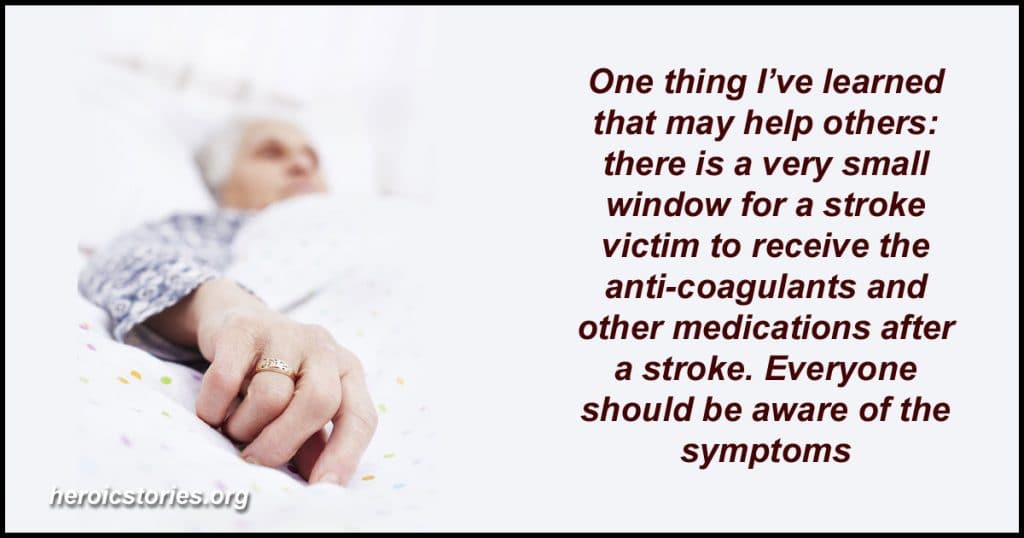Sandra Sebastian
Indianapolis, IN

It all seemed to happen so suddenly. One minute, my mother was talking normally, and the next, she was babbling baby talk. Being seven hundred miles away from your parent when they obviously need medical attention is one of the scariest things I have ever gone through.
Let me give you a little background. My mother moved to the middle-of-nowhere Missouri with my stepfather. He wanted to be back in familiar surroundings. He has been suffering with numerous health problems, including Alzheimer’s. My mother is his caregiver and the love of his life. His world revolves around her, and hers around him.
Last Wednesday, the older of my two brothers made his weekly call to check in with her. The conversation became very weird when she suddenly began speaking gibberish. We assumed that a new medication may have caused a bad reaction, or that she’d had a minor stroke. He called the next morning, and she was still unable to communicate with him. He immediately called the neighbor across the street.
The neighbor called another neighbor down the road, who is a first responder. She immediately recognized the signs of a stroke and called an ambulance to take my mother to the hospital 45 minutes away. She has been there for a few days now. While the doctors will take good care of her, my ailing step-father needs assistance of his own. These wonderful neighbors have continued to watch over him, making sure he takes his medication and that he and the pets are fed. They even cut the very overgrown yard and took my stepfather to the hospital to see my mother.
They rallied around my family to make sure my stepfather was ok until my brother got there 24 hours later — and their assistance continues. They have helped my brother with all manner of issues with the house. There were broken pipes that needed mending and trash that needed to be hauled away. They have been there every step of the way to help as needed.
They are definitely our angels of the prairie.
One thing I’ve learned that may help others: there is a very small window for a stroke victim to receive anti-coagulants and other medications given after a stroke. Everyone should be aware of the symptoms and err on the side of caution to get care for someone who they think might have suffered a stroke. We may never know whether the damage to her mind and body would have been less severe if we had gotten her to a hospital sooner.
Podcast: Play in new window | Download (Duration: 3:53 — 3.6MB)


Please correct the spelling “Prairie”.
Good story. I sent it to friends but included the symptoms of stroke:
(Please see note about symptoms below!)
Think FAST… the F-A-S-T symptoms of stroke.
F= Face drooping
A= Arm weakness
S= Speech difficulty
T= Time to call 911
Unsure? Call 911 anyway!! Every minute counts!
My inner perfectionist agrees with you, Walt!
Wait, he waited until the NEXT morning to call a neighbor to check on her?
Yes, which is why I included that important paragraph on how important time is when dealing with a suspected stroke. It’s an important lesson for all.
Excellent story, as usual. Thanks for correcting the typo. 🙂
Regarding stroke symptoms — there’s another one that is not often included in the symptom list, and won’t fit the FAST acronym.
Dizziness.
We don’t think of dizziness as a stroke symptom – we think of it as vertigo, or an inner ear issue. But just like you can have cerebral strokes (the most common kind), you can have cerebellar strokes, that affect the cerebellum. They’re MUCH less common (less than 3% of all strokes), but they exist, and are challenging to diagnose because the primary symptom is vertigo. Hence, they’re often misdiagnosed, at first.
How do I know this? Because last April, I ignored my own intermittent dizziness for 3 days, thinking it was a bout of vertigo. I told friends it wasn’t fair to be this dizzy without having been to a really good party. LOL
It wasn’t until the Dramamine didn’t help that I asked a friend to take me to urgent care. I was able to walk in under my own power – again, more reasons why I didn’t even consider it being a stroke, or calling 911.
Urgent care was about to close, so they told my friend to take me to ER. I found out that if you tell ER you’re dizzy, you get a room right away. LOL And they follow their stroke protocol — CT, MRI, etc.
The CT was clear, but the MRI showed that I’d had a massive cerebellar stroke – the ONLY symptom was dizziness. We’d never had diagnosed it without the MRI.
So please, don’t ignore unexplained dizziness. Treat it like the other stroke symptoms. It might just be vertigo, but let the doctors decide that.
Oh, yeah… I should add that I’m one of the lucky ones. Most cerebellar strokes can take 2-3 years for recovery. I’m coming up on my one-year anniversary with no residual effects from my stroke. But I will never again ignore unexplained dizziness. Neither should you.
Another not fitting in is vision. Any sudden change in vision can be a sign. Eg; One eye suddenly focusing differently from the other or not following the other. Time to take an aspirin and get checked out.
A friend of mine had a stroke last year, and her ONLY symptom was a sudden loss of peripheral vision in her left eye. They’re not always incredibly obvious.
Sandra–Thank you so much for writing this — there are so many that will read this and know the symptoms. I can’t imagine being so far away, trying to resolve this and get to her. I’m so sorry for your mom’s stroke.